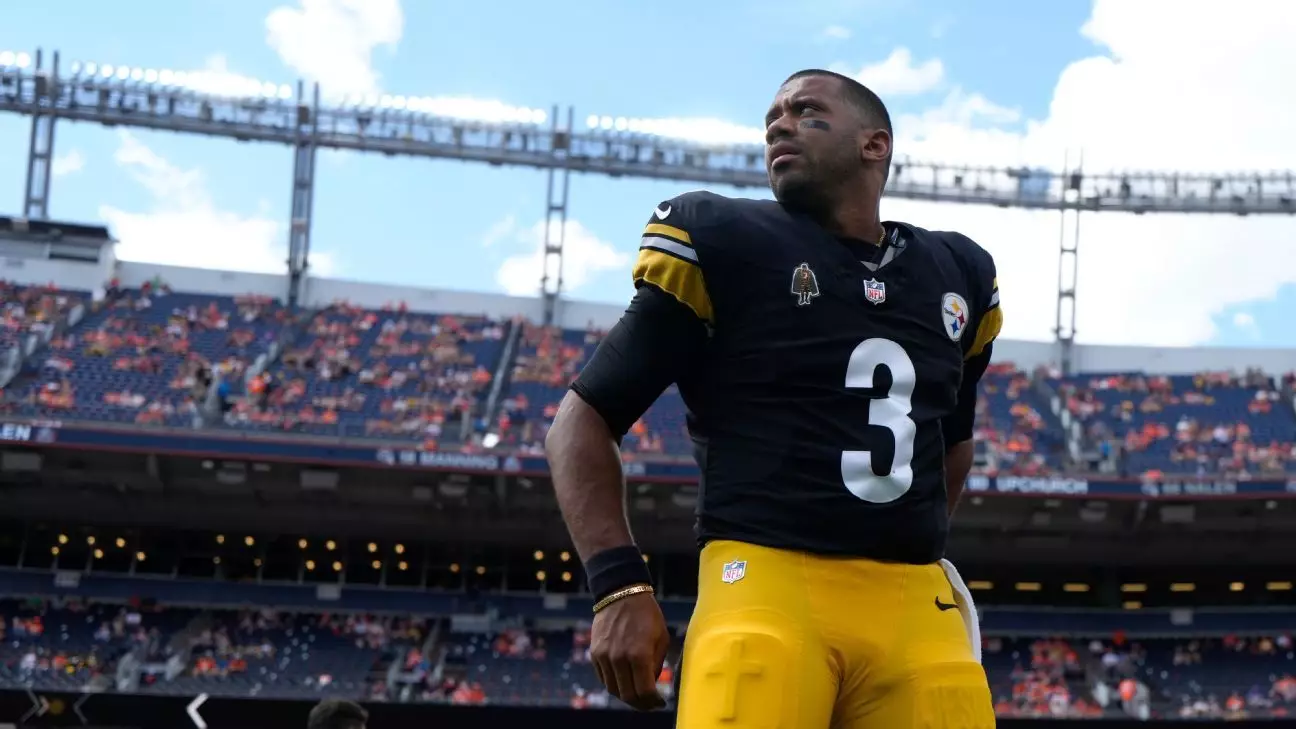In the high-stakes landscape of the NFL, narratives often revolve around player rivalries, comebacks, and personal vendettas. The recent clash between the Pittsburgh Steelers and the Denver Broncos featured intriguing storylines and highlighted the complexities of a quarterback’s journey. While Russell Wilson may not have stepped onto the field during the Steelers’ narrow 13-6 victory over the Broncos, his presence loomed large, thanks to his past association with the Denver franchise and his strained departure from the team. This article dissects Wilson’s sidelined role and broader implications on player dynamics in professional football.
Russell Wilson received a rather unconventional accolade during the game: a “petty game ball” from Steelers coach Mike Tomlin. This gesture wasn’t merely an act of charity; it was a symbolic nod to Wilson’s tumultuous journey in Denver. Coach Tomlin has a history of recognizing players who face their former teams, and this act served as both a tribute and a balm for Wilson as he continued to grapple with the repercussions of his controversial era with the Broncos.
His teammates and peers, like quarterback Justin Fields, acknowledged the emotional weight of the situation. Fields noted the sense of camaraderie within the team and how achieving a win for Wilson enhanced the significance of the moment. In an environment often driven by personal agendas and rivalries, this instance exemplified the underlying respect and fraternity shared among players, regardless of past affiliations.
Wilson’s inactive status during the game stemmed from an aggravated calf injury. Nevertheless, he embodied resilience and determination, throwing passes and forming connections with familiar faces on the field before the match. For a player once lauded as a franchise cornerstone, the juxtaposition of his situation against his prior successes showcases the volatile nature of professional sports.
As he engaged with former teammates and coaches, one couldn’t help but feel the heavy nostalgia of what once was. The moment became a personal reflection of Wilson’s achievements, challenges, and the bittersweet nature of professional sports. It emphasized how even the brightest stars can confront obstacles that reshape their career narratives.
While Wilson’s emotional return captured the headlines, the focal point of the game rested on Fields’ performance as the Steelers’ starting quarterback. His initial success, completing 10 out of 12 passes for 101 yards and a touchdown, contrasted sharply with his struggle in the second half, netting a meager 16 passing yards. Such inconsistency serves as a reminder that the pressures of quarterbacking extend beyond individual talent; they encompass cohesive team functioning and strategies that can enhance or stifle performance.
Fields’ acknowledgment of the hurdles facing his team further illuminated the challenges inherent in the NFL. Winning, especially in hostile environments, is rarely straightforward. It often requires synchronization among players, solid tactical execution, and the ability to adapt under pressure—factors that can heavily influence a quarterback’s on-field efficacy.
Despite the competitive nature of the league, Wilson’s approach to his return spotlighted the value he places on relationships, as reiterated during his pre-game statements. The personal connections made over his tenure with the Broncos added a layer of complexity to his return; however, his focus on the game itself underscored a professional maturity.
Understanding the delicate balance of fostering relationships while navigating the competitive landscape of the NFL may serve as a blueprint for future quarterbacks. Being able to appreciate the human element of sports could mitigate animosities and promote sportsmanship, reinforcing the sport’s inherent camaraderie among its participants.
The narrative surrounding Russell Wilson’s return to Denver manifests a broader dialogue on player identity and the emotional landscapes navigated in professional sports. The blend of personal history, collective teamwork, and evolving player dynamics reflect the complexities of the NFL. While Wilson may not have played in the game, his journey remains a testament to resilience, relationship-building, and the inherent challenges of a career rife with highs and lows. The essence of sports may lie in competition, but it is the formation of lasting connections that ultimately leaves an indelible mark on players and fans alike.


Leave a Reply